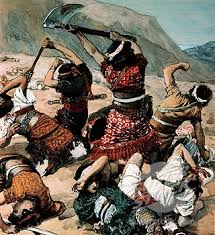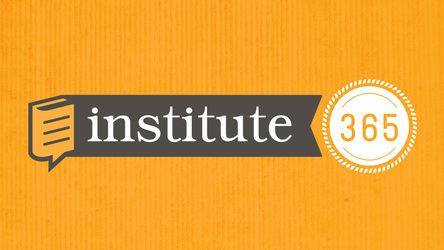|
(This is an updated version of a post I initially composed on July 22, 2014.)
I've recently gotten a few questions from people asking very specifically how they can get emails with updated posts from the Brookside Institute blog, without having to remember to check in periodically on their own. They want to stay in the loop, but they won't always remember to go looking for new content. And when they do remember, they may not be near a computer or it may not be a convenient time. I love this question. I love it that people want to stay in the loop, and that we're providing valuable enough content that people want to stay engaged. Here's how I respond to this question: There's no way that I know of to get emails specifically from the Brookside Institute, providing updated content as new posts are published. (If I'm missing something on this, someone please let me know!) However that doesn't mean there's no way to conveniently stay in the loop. The solution is to subscribe to something called a "feed reader" that will collect the content (the "RSS Feed") you want from sites you subscribe to. Then, you simply monitor your feed reader and can conveniently stay up to date on the content you've chosen to subscribe to. Below I've included some detailed steps on how to subscribe to an RSS Feed and have it collected into a feed reader. Before I get into that, though, let me briefly share WHAT an RSS Feed is and WHY subscribing to the RSS Feed can be helpful.
0 Comments
6 Books that Can Help You Respond to the Uncomfortable - But Unavoidable - Reality of Suffering7/12/2016 D.A. Carson begins his book How Long, O Lord? Reflections on Suffering and Evil with these words: One of the major causes of devastating grief and confusion among Christians is that our expectations are false. We do not give the subject of evil and suffering the thought it deserves until we ourselves are confronted with tragedy. If by that point our beliefs - not well thought out but deeply ingrained - are largely out of step with the God who has disclosed himself in the Bible and supremely in Jesus, then the pain from the personal tragedy may be multiplied many times over as we begin to question the very foundations of our faith" (p. 11). In other words, there is tremendous value in thinking about suffering and evil even when our lives aren't directly touched at the current moment by these things. But let's be honest: For most of us, thinking about suffering and evil isn't an abstract thought-exercise. Thinking about suffering and evil brings real feelings to the surface, it revisits personal tragedy we've experienced or are experiencing, and it brings sin and the brokenness of our world to the center of our attention.
For all of these reasons, then, reflecting on a distinctly Christian perspective of suffering and evil is vital. Whether suffering "feels" distant or near, there's value in both embedding ourselves in Christian truth and surrounding ourselves with voices who can relate and speak to our struggles. As D.A . Carson goes on to say, "The truth of the matter is that all we have to do is live long enough, and we will suffer" (p. 16). Certainly, the Bible should always take pride of place in providing perspective and coming alongside of us as we experience pain and suffering. Books like Job and Lamentations can be precious here. And learning that Jesus relates to our pain and suffering - that He himself experienced injustice, loss, tragedy, grief, and more - teaches us that Jesus is our ally and a shoulder to lean on as we endure and address our own suffering. Other Christian books can also play a role here - at articulating biblical truth in a helpful way, and sharing personal experiences of suffering, grief, and pain. With this last comment in mind, then, below are six books that I suggest to those who are looking for resources to help them reflect on a distinctly Christian perspective on and approach to the reality of pain, suffering, and evil. (One more quick, but really important, comment: Working through issues like suffering, pain, and evil should never be done with just you and a book - as helpful as books can be. Remember to also surround yourself with Christian community and consider the value of pastoral and/or professional counseling if appropriate.) All right, on with the book recommendations: I'm currently (and finally!) making my way through Richard Lints' The Fabric of Theology: A Prolegomenon to Evangelical Theology, and ran across this short quote by Peter Berger that's worth highlighting here (quoted on p. 29 of Lints' Fabric of Theology): When churches abandon or de-emphasize theology, they give up the intellectual tools by which the Christian message can be articulated and defended. In the resulting chaos of religious ideas, the principal criterion left to the community as it seeks to find its way is, quite naturally, that of expediency" (Peter Berger). In just a few words, Berger reminds us of an important VALUE of theology: theology helps articulate and defend the Christian message. Let's keep this value of theology in front of us! If you liked this post, you may also be interested in "The Importance of Systematic Theology."
As Brookside Church has been reading through the Bible in 2016, one of the questions I've gotten numerous times relates closely to this question: "What's Up with All the Violence in the Old Testament?" Earlier this week, I taught a Brookside Institute seminar on this topic - giving others the opportunity to dig more deeply into it and interact about it. Below I've included the audio from this seminar. Or, if you're interested in a text version of what was covered (things will be pretty similar to the audio, though not identical) keep reading below. At the very end of this post I've include a PDF "Answer Key" of the handout I made available.
As part of Brookside's plan to spend time daily reading through the Bible in 2016, the Institute is offering a series of seminars that will line up with what we're reading and dig deeply into certain topics. And as we've been reading through the first five books of the Old Testament, one of the remarks/questions I've heard repeatedly goes something like this: "What's up with all the violence in the Old Testament?!" I've gotten this question enough times to think that this will be a good topic to devote a seminar to! People who are antagonistic towards Christianity (and/or religion in general) often use some of the "violence passages" in the Old Testament as ammunition against religion. Famously, Richard Dawkins has said The God of the Old Testament is arguably the most unpleasant character in all fiction: jealous and proud of it; a petty, unjust, unforgiving control-freak; a vindictive, bloodthirsty ethnic cleanser; a misogynistic, homophobic, racist, infanticidal, genocidal, filicidal, pestilential, megalomaniacal, sadomasochistic, capriciously malevolent bully" (The God Delusion, p. 232). Even if you only understand half of those words, you know that Dawkins isn’t being complimentary. And from this language that Dawkins uses, we see that a large part of his critique is directed at how he understands the violence we read about in the Old Testament. Does the violence we read about in the Old Testament mean that God is a bloodthirsty ethnic cleanser? Is he sadomasochistic, and a divine bully? How should followers of Jesus Christ who maintain the authority of the Scriptures think about this violence that is obviously evident in the Old Testament? This coming Wednesday evening - on March 30, 2016 - the Brookside Institute will be offering a seminar that wrestles with this question and offers a way forward. Whether you're an attendee of Brookside Church or are simply in the Omaha area and want to dig into this in a gracious, respectful way, we invite you to join us. There's no cost to attend, but you can help us know how to plan by signing up here. Interested in other seminars that the Brookside Institute will be offering this year? Or do want to see some things we've already done that line up with what Brookside Church is doing as we read through the Bible? Click here to see more.
One of the (many) things that I love doing as a pastor is fielding some of the various theological questions I get. As someone who cares a lot about helping build and reinforce foundations of the Christian faith, and helping form people theologically, these sorts of interactions provide a fun - and important - opportunity.
Last week, a question about one part of the recent Young Messiah movie came through my inbox. I've not seen the movie myself and so I don't first-hand experience with the scene that was described (there's my disclaimer!). Nevertheless, let me paraphrase/summarize the question that came my way, and then include the way I responded. Here's the question I got: I understand that the Young Messiah is fictional, and that there's no scriptural support for much of Jesus' life before His public ministry. Nevertheless, I have a question about one of the scenes. The movie portrays Jesus as unaware (or at least unsure) of his divinity when he's young - about age 7. In fact, the climactic moment of the movie portrays Mary telling Jesus the story of his conception and birth after having withheld the information for his own protection up to that point. A few questions came to mind after watching that scene. How could Jesus have ever been unaware of his deity if he was "wholly God?" On the other hand, how could he have possessed such sophisticated self-awareness from birth if he was "wholly human?" One movie is not a big deal but I am curious as to whether there is a reliable answer to this question? Here's my response (in a very-slightly-edited form): Late last week, I was able to present at a Teacher In-Service for Cornerstone Christian School. The topic I was asked to teach on was "The Importance of the Christian Worldview." After studying for the talk and interacting with the teachers, I'm as convinced as ever that Christians need to understand what worldview is, why a Christian worldview is so important, and how we grow in our understanding (and embodiment!) of the Christian worldview.
This topic breathes purpose and perspective into how we think about the different "arenas" of our lives (e.g. jobs, entertainment, family, etc), and it prompts us to think well about God and His Word, the Bible. Keep reading to see the talk I gave (in a somewhat modified, abbreviated form) on Christian worldview. At the very end of this post, I've included an "answer key" version of the handout I made available to the teachers. As readers trek through the book of Exodus, one of the issues that causes many to scratch their heads is the hardening of Pharaoh’s heart.
We read about this hardening of Pharaoh’s heart in Exodus 7:1-5. In this passage, God tells Moses, “I will harden Pharaoh’s heart” (v. 3). Despite the signs that God performs in Egypt, Pharaoh will not listen to the message that Moses and his brother, Aaron, bring. God will nevertheless deliver His people from slavery, with this stated result: “And the Egyptians will know that I am the LORD when I stretch out my hand against Egypt and bring the Israelites out of it” (v. 5). Pharaoh’s hard-heartedness then remains a theme throughout this section of Exodus. There are times when Pharaoh’s heart is simply described as “hard” or “unyielding” (Exodus 7:14, 22; 8:19; 9:7). There are times when Exodus records that Pharaoh hardened his heart (Exodus 8:15, 32; 9:34) And there are times when we’re told that the LORD hardens Pharaoh’s heart (Exodus 4:21; 7:3; 9:12; 10:20, 27; 11:10). How should we think about this hardening of Pharaoh’s heart? One of the top five questions I get (and get again and again) as a pastor surrounds how we make sense of God's sovereignty on the one hand and human freedom (or responsibility) on the other. The question usually goes something like this: "If God is absolutely in control of everything, how can humans be free?" Or "How can God hold us responsible for choices He's ultimately in control of?"
I'm not going to solve this mystery here. (There's my disclaimer!) But I do want to include an excerpt about this topic from Against the Flow by John C. Lennox (Professor of Mathematics at the University of Oxford and Emeritus Fellow in Mathematics and Philosophy of Science at Green Templeton College). You can find out even more about John Lennox and what he's doing here. I intend for this to be good food for thought as we consider and process this mystery of God's sovereignty and human responsibility: Based on the number of "hits" each month, here are the top 5 posts here on the Brookside Institute blog for the last six months - since January 2015..
Did you miss any of these? Click on any of these "Top Posts by Month from January-June 2015" to be taken to the post, and check 'em out! (It's not too late!) |
Tim WiebeChristian. Husband. Father. Pastor. Learner. Contributor. Reader. Categories
All
Archives
June 2024
|
© 2014-2024 | 11607 M Circle, Omaha NE, 68137 | www.thebrooksideinstitute.net











 RSS Feed
RSS Feed
